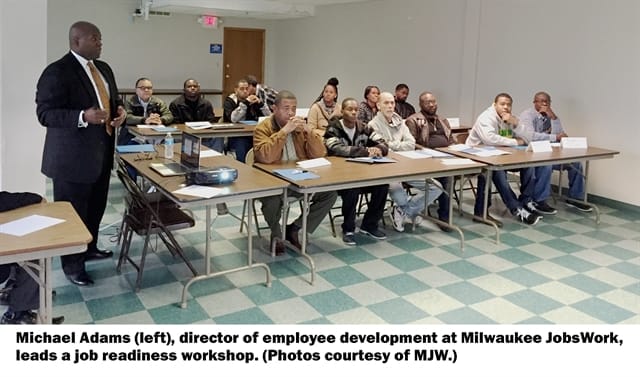Milwaukee JobsWork pursues a multi-level business strategy based on the conviction that sustainable employment leads to self-sufficiency and local business growth is necessary for expanded opportunities.
In his seminal book “Toxic Charity,” longtime urban activist Robert Lupton highlights the destructive consequences of treating people in poverty as if they were helpless and have nothing to offer. Compassionate people and organizations, he writes, should “never do for the poor what they have the capacity to do for themselves.”
It is this premise that guides the efforts and mission of Milwaukee JobsWork (MJW), a workforce and small-business development program focused on helping chronically unemployed people living in generational poverty. More than 50% of the job-seekers the program has helped have felony convictions, says MJW President Bill Krugler.
“Our whole goal is not to take care of people in poverty; it is to help people help themselves get out of poverty,” Krugler says. “By taking care of people, we’re holding them down. We’re not allowing people to be what they were created to be.”
MJW pursues a multi-level business strategy based on the conviction that sustainable employment leads to self-sufficiency and local business growth is necessary for expanded opportunities. The program connects “hard-to-employ” job-seekers with small businesses and, in turn, connects small businesses with larger anchor institutions that use their services.
Krugler initially focused on small-business development, a natural segue after 30 years of work at private equity firms helping to grow and improve small and medium-sized companies. He retired with a vision to apply his business acumen to urban challenges.
He began by asking large Milwaukee employers to steer contract work to small central city businesses that then could hire additional workers. After recruiting a half-dozen anchor institutions and a handful of small businesses, he turned to existing workforce development programs to find the employees. He quickly discovered a significant gap.
“Most jobs programs are not set up to work with individuals who have truly significant barriers to employment success,” Krugler says. “Many times, the person is placed before they were actually prepared to keep a job and succeed at a job.”
As a result, employees often would become frustrated and quit or do something that got them fired, fueling a cycle of unemployment and discouragement.
So MJW expanded its portfolio, adding a program that provides training, job opportunities and ongoing support — both to the employee and employer. It was at this time that Krugler connected with his partner, Michael Adams, a business owner with human resources and career development experience. Adams helped develop MJW’s unique Employee Development program, which he currently leads.
JobsWork is financed through foundations and individual donations. It does not accept government money in order to maintain flexibility and avoid “solutions” imposed from afar. MJW, which was incorporated in 2013 and received nonprofit status a year later, now has five full-time employees; Krugler hopes to hire three more this year. “It’s just been really in the last six to nine months that we really started to build a little bit of momentum,” he says.
Long-term approach works
The program’s long-term, relational approach made all the difference for Robert, a 35-year-old Milwaukee resident who discovered JobsWork in May 2015. Robert had participated in job readiness programs before and had even landed good jobs, but says he always ended up losing them as a result of “incarceration” or “personal trials.”
It became clear that the JobsWork experience was different when Robert started the training workshop: two weeks of sessions that provide life skills, identify personal barriers to stable employment and emphasize spiritual renewal and motivation.
“It was therapeutic,” Robert says. “We got the résumé side, but we also asked questions like, ‘Why can’t I keep a job?’ or ‘Why can’t I get along with co-workers?’ or ‘Why do I always have an attitude?’ ”
He completed the workshop last July and was hired by Outpost Natural Foods, one of MJW’s “stability employers.” He has been with Outpost for nearly 10 months, gaining the stability he needs to land a position that will allow him to become self-sufficient.
As is often the case with the chronically unemployed, there were occasional setbacks. At one point, Robert was designated as a “no contact” with his parole officer and found himself back in jail. During a weekly checkup with the employer, Adams discovered that Robert hadn’t showed up for work. Adams was able to iron things out with the parole officer and the employer, and Robert was soon back on the job.
“I could have lost my job,” Robert says. “Having JobsWork advocate for me helped a lot.”
Krugler says JobsWork now asks all of its job-seekers under supervision for the names of their probation agents and then proactively contacts the agents to establish a relationship.
The stability employers — janitorial services, landscaping companies, painting businesses and the like — combine both grace and accountability when working with those who have been chronically unemployed, says Krugler.
“The stability employment … is an opportunity to work in a supportive environment,” he says. “When you make a mistake, you’re not yelled at. Rather, the employer is going to help the individual learn from mistakes.
“People are chronically unemployed, typically, because they’re making the same mistakes over and over and over again,” he adds. “Nobody ever took the time to teach them from their mistakes.”
Criminal records, combined with a lack of references and work experience, make it nearly impossible to land a good-paying job. Stability jobs provide employees with something to discuss at an interview besides their prison time and spotty work record.
The stability employer, in turn, gets “a complete wraparound of support” from the JobsWork team, all of whom have business backgrounds. Central city entrepreneurs gain connections with larger customers, a pipeline of screened, trained and supported employees and business mentorship.
‘They care about you’
MJW’s vision was a natural fit for Wheaton Franciscan Healthcare, says Nancy Bayer, commodity manager for the not-for-profit health care system.
“They told us they were looking to get the inner city community back to work with sustainable jobs,” she recalls. “Wheaton has a mission to help the poor and the underprivileged. What better way to do that than to help people get jobs and better themselves?”
Wheaton contracted with two MJW stability employers, including Trotter Industries, which provides professional cleaning services. Larry, 39, has worked for Trotter for nearly two years. He earned his pharmacy technician certification and, with the help of MJW, secured a volunteer position at a pharmaceutical dispensary at a church-based health clinic. Now, in addition to his nighttime janitorial work, Larry has a second job in a pharmacy technician program. He’s looking for a full-time position in that field.
“They care about you,” says Larry about the JobsWork team. “Other people, they help you find a job and then let you go.” But the MJW staff works with you “no matter what. Whether you’ve been there for a month or a year, they still stay with you.”
And the benefits are more than economic. Consider the case of D’Andre, a 30-year-old man who showed up at Milwaukee JobsWork with tattoos, gold teeth and a felony record. After demonstrating his determination to change, D’Andre was hired by a landscaping company, one of MJW’s stability employers. He worked there two months when someone close to him was murdered.
“I was able to talk to him that very night,” says Adams. “I asked, ‘How are you doing?’ and ‘What are you going to do?’ And he said, ‘I know what I would like to do — be out on the street retaliating.’ But, he said, ‘That’s not me anymore. I realize where that’s going to take me, and that’s not where I want to go.’ ”
“It was a very tragic situation,” says Krugler. “But it was so rewarding to know that he had started this process of separating himself from his past and starting to make a better choice. That was a big step.”
An individual’s determination to better himself or herself is essential for the JobsWork model to work, he adds.
“We combine the discipline of a for-profit business with the heart of a nonprofit,” he says. “We’re not here to drag anyone along. Do you live in poverty, and do you want to change your life? Then we provide a pathway. Restoring human dignity is at the core of what we do.”
Michael Jahr is co-founder of the Better Yes Network, which connects and strengthens nonprofits that focus on personal and community restoration. He has written on policy issues for The Wall Street Journal, The Weekly Standard and numerous other publications.








